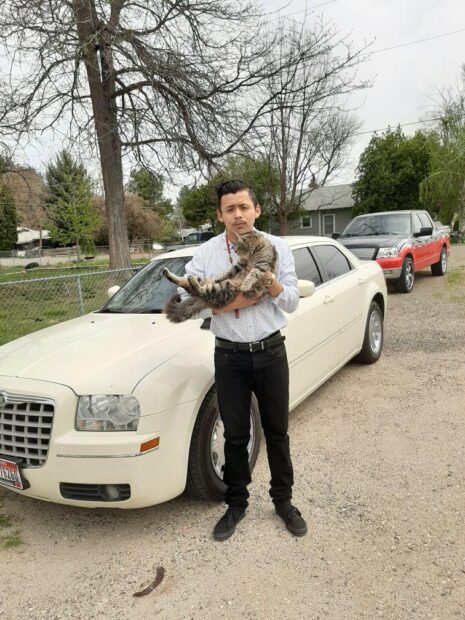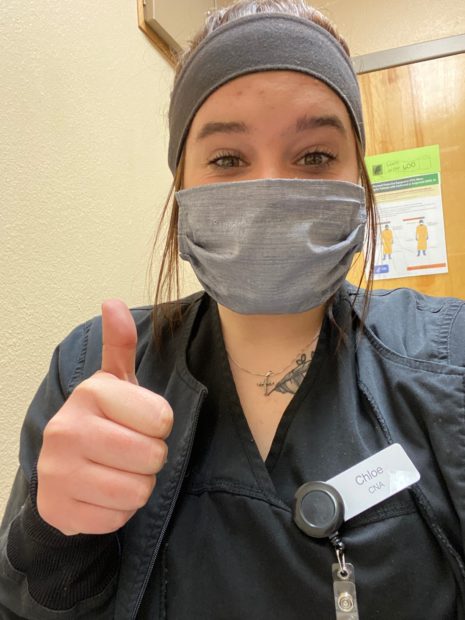Annastaisa Walters delivers food orders at a Sonic in Pocatello.
Luis Andrade works at a factory in Caldwell, making cookies and granola.
Chloe Morgan takes care of residents in a Treasure Valley nursing home.
Across Idaho, students are outside the shelter of their homes, working in essential jobs that help sustain healthcare, retail and food markets. Some have increased their hours, or taken on new jobs, as their schools moved to a more flexible remote learning schedule.
Balancing work and school could teach teens lessons in time management and sacrifice, educators told Idaho Education News. On the other hand, they worry it could also distract students from school, or convince them they don’t need a degree to be successful.
Either way, the trend contributes to a fundamental shift in the daily routine for both students and educators.
Harold Nevill, who runs the Canyon-Owyhee School Service Agency in Southwest Idaho, said some of his teachers have shifted classes to the evenings to help accommodate the 30-50 percent of COSSA students who are now working.
“The State Board of Education believes that all we need to do is shift the delivery method — online, or remote, however that looks — and students are going to continue doing classes during the day. And that is not what we’re seeing at all,” Nevill said. “We’ve got a huge number of our students who have gone to work for one reason or another, so we’re having to make allowances for that.”
Here’s how three Idaho teens are trying to strike a balance between work and school.

Annastaisa Walters, 18
On her longer shifts, Annastaisa Walters tucks her computer behind the counter at Sonic and tries to answer homework questions between running deliveries out to cars.
“There have been days where I work 13 hours and I need to, I have homework due at midnight,” Walters said.
Walters, a senior at American Falls High School, was working at Sonic before her school closed its doors because of COVID-19. Once school went online, her hours at the fast food chain “increased rapidly.”
In part, Walters said, she had more time and wanted to work more hours. The store also saw an unexpected rush in demand and needed more employees on deck. Walters is working toward a manager position and tries to come in when the store is short on carhops or cooks.
In the last month, her hours have almost doubled. She’s working 40 hours a week.
“It’s nice to get more income, but it sucks because school should be my number one priority and work is kind of overpowering it right now,” she said. “It’s made it really hard.”
Walters only has two classes to finish her senior year: government and painting. Before school closures, she attended those classes in the morning, and had the rest of the day free.
Now, she’s sometimes scheduled for work in the morning, and has to find other employees willing to trade shifts so she can Zoom into her government class meetings. After full days at work, she’d rather sleep than do class readings — and she thinks she could have done a better job on some of her assignments.
“It’s sometimes really hard to find the motivation, but I have to,” Walters said. “I can’t let this be a setback. I have one month and I really just want my diploma.”

Luis Andrade, 17
Two years ago, Luis Andrade decided to drop out of high school to work full-time.
He doesn’t plan to make that decision again.
“I want to be more than just a worker. I want to be somebody important,” said Andrade, 17, who is in the alternative program at COSSA.
Andrade works at a food factory in Caldwell, making cookies and granola. Before school closures, he was working part-time, helping his parents pay the bills and earning money to work on his car.
Now Andrade is working full-time, starting around 6 a.m. most days. After work he does hours of schoolwork using his cellphone, because he doesn’t have a computer. He’d rather talk to his teachers face to face.
“This is my first time doing online stuff. I don’t really like it, but I don’t have an option,” Andrade said. “I don’t want to lose my credits.”
When Andrade was 16, he dropped out of school in Homedale to work full time at a landscaping company. A year later, he decided to enroll in COSSA’s alternative school to get back on track to graduate.
This time, he’s balancing his workload with his online classes. And he thinks it’s paid off — last week he got promoted to junior operator at the factory where he works with his mom. And he’s still working toward graduation.
“If I graduate from school, I’ll be the first in my family to do it,” he said. “That’s really important for them…and for me.”
Andrade would like to be a psychologist someday, or a lawyer.
Chloe Morgan, 17
Residents at Chloe Morgan’s nursing home are restless.

Behavioral challenges, like Alzheimers and dementia, seem to be amplified by the COVID-19 crisis, said 17-year-old Morgan, a certified nursing assistant. Residents who used to go to the YMCA or have frequent visits with family have been cut off from those activities, so staff like Morgan are coming in more often to spend time with them.
For one resident, who sometimes tries to leave the facility to see her family, that means calling her family as often as possible, since they can’t come visit. For another who loves getting her hair done, it means helping style her hair in-house.
“With the behaviors, one-on-one time seems to be the best solution,” Morgan said. “So they want to keep us as fully staffed as possible.”
Morgan’s schedule fluctuates week to week, she said, but she spends at least three days a week working shifts that start at 6 a.m.
“It is definitely scary coming home to my family every night after working, but I am doing my best to keep everything as safe as possible,” Morgan said of working during COVID-19. “I love healthcare too much to stop working because of this virus.”
Morgan, a senior at the Notus Junior/Senior High School, says she misses the in-person aspect of her classes — particularly her EMT-training — and having an established routine to balance work and school. Talking to her teachers helps, she said, and she tries to keep her own routine on track by waking up at the same time every day.
It’s a stressful time, Morgan said, but she tries to stay positive.
“We’re going through a time right now that we’re going to remember in 30 years when we’re talking to our kids and grandkids, when they’re seniors in high school, and telling them what we went through, ” Morgan said. “I think that can be kind of cool to think about.”
